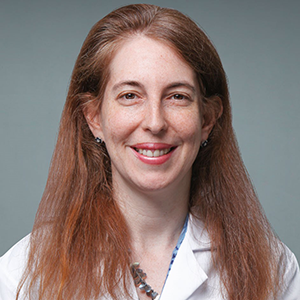T cell Memory in Cure of Diffuse Large B Cell Lymphoma: An Investigation of the Immune Interactome

Catherine Diefenbach
MDNYU Grossman School of Medicine
Project Term: July 1, 2024 - June 30, 2027
While many patients with diffuse large B cell lymphoma (DLBCL) are cured with initial treatment, some patients relapse even after multiple therapies, and their outcomes are poor; we believe that the quality of the patient’s T cell memory plays a critical role in determining how they respond to treatment. To investigate, we will analyze the response pattern of circulating immune cells in cured and relapsed DLBCL patients, as well as the immune signals generated by the tumors, and create CAR T cells from the T cells with anti-tumor properties found in cured patients. We will evaluate the ability of these CAR T cells to fight lymphoma; if successful, our research can rapidly be translated into new immune therapies for patients with high risk or relapsed DLBCL.
While many patients with aggressive diffuse large B cell lymphoma (DLBCL) are cured with initial treatment, some patients are not cured, or their lymphoma relapses after treatment. Cure is possible for some with treatments such as CAR T cell therapy, but many patients relapse after these treatments, and their long-term outcome is poor.
We believe that the quality of the patient’s T cell memory plays a critical role in determining how they respond to treatment. Specifically, we believe that patients who are cured develop a new population of memory T cells directed against their lymphoma, which is not seen in relapsed patients. To investigate this, we will study immune responses in DLBCL patients who are cured and those who relapse, with a goal of identifying specific immune patterns that are associated with cure. This information may help us to find potential new pathways for anti-lymphoma drugs and new targets for lymphoma immunotherapy. This project will combine the lymphoma and immune expertise of the Diefenbach lab, with the Yarmarkovich lab’s expertise in immune analysis. The goal of this research is to analyze the interactive immune response between circulating immune cells and the immune signals presented by lymphoma, in cured and relapsed DLBCL patients, the “immune interactome”. We will use this knowledge to develop new and innovative immunotherapies through 3 specific aims.
SA 1: Using banked lymphoma samples from the Diefenbach lab we will characterize the immune signals presented by lymphoma in relapsed and cured DLBCL patients, analyzing the proteins presented to the immune system by major histocompatibility complex (MHC) molecules on the tumors. We will then integrate this information into our database and use big data analysis to identify immune targets. SA2: We will investigate the immune response in both cured and relapsed DLBCL patients by analyzing circulating B and T cells at the level of a single cell pre- and post-therapy, capturing immune cell characteristics in cured and R/R patients. This comprehensive analysis will provide a deep understanding of the immune response at the cellular level in both patient groups.
SA3 To understand how B and T cells fight DLBCL in cured patients, we will focus on identical populations of T cells (clones) that have potential anti-lymphoma activity. We will create CAR T cells from these T cell clones and evaluate the ability of these CAR T cells to fight lymphoma by testing them with tumor samples from patients. Finally, we will screen a panel of CAR T cells for their effectiveness in targeting and destroying tumor cells that match a patient’s specific tumor type. Impact: This study represents the first in-depth analysis of the “immune interactome” in DLBCL. If successful, our research can rapidly be translated into new immune therapies for patients with high risk or relapsed DLBCL.